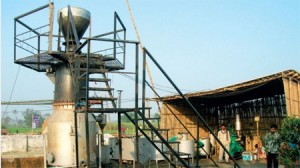January 2011
Businesses are changing lives for millions of people living in extreme poverty. By investing in businesses that serve the poor, charities are changing the way the world tackles poverty. Businesses that are successful in serving people who live in poverty seek profit to grow and function independently, but do not aim for excessive profit. They offer products and services that create sources of income, jobs, and increase quality of life. However, because these businesses do not seek excessive profit and generally operate in poverty stricken areas funding and support is often impossible to find. By investing in and educating these entrepreneur charities are changing the world.
There are many examples where this method is working. One example is Husk Power:
In India 375 million people live without electricity. The government has declared many of these people “economically impossible to reach by conventional means.” In early 2010 a charity (Acumen Fund) invested in an entrepreneur who is changing this. With the charities help via investment and education, he built Husk Power; a business that uses left over rice husks to fuel village power plants, creating clean and safe electricity. Today, after less than a year, Husk Power is providing over 100 000 of these “impossible to reach” people with electricity for six to eight hours a day for less than two dollars a month. By 2014, they plan to serve 5 million people. They will then also be able to return the charity’s investment to be re-invested in the next entrepreneur that will change the lives of people trapped by systemic poverty.
Are the poor a safe investment?
What if instead of giving two, three, four dollars a month for a charity’s sake, you gave ten dollars a month for a 5 percent share of that kid’s future earning? Turning it into an investment changes everything. Now it’s in your interest that, that child is healthy and learns to read and write. In this system both the investee and the investor are much more likely to be successful.
“The poor are neither too stupid or too passive to earn money. On the contrary, having to fight continually for survival has honed their innovative skills. All they need is capital to get them going.” Muhammed Yunus, Grameen Bank
In fact, Grameen Bank (a charity that grants small loans to poor entrepreneurs) has had 95% of their loans paid back. Grameen’s method to success is based on his theory that “Banks know how to distribute money effectively – social entrepreneurs know how to distribute it justly.” Together banks and social entrepreneurs are able to ensure loans are given on acceptable terms; and ultimately have been successful in granting profit-producing loans.
Imagine how capitalism and globalization will change the world when it catches on that investing in the poor is profitable. Consider a bank giving a loan to a corporation to build a school, hospital or dormitory, not because it is the right thing to do, (they don’t care!) but because it’s the profitable thing to do.
Investologist Prognostication
Jeremy Leonard“When you break the big laws, you do not get liberty, you do not even get anarchy. You get the small laws” G.K. Chesterton.
January to has been a good month for the Investologist (written January 31st):
My publicly traded portfolio is concentrated on the oil sector, and so things have been good, with an upswing of 9.5 percent during the month of January. Although we are not seeing the highs experienced in 2007, we are busy on the ground in Alberta, and the number of qualified people available for the oil industry is less than the positions available once again.
Major Holdings:
Connacher Oil and Gas, CLL-T
Mullen Group, MTL-T
TitanStar Properties, TSP-X
Minor Holdings:
TD Bank, TD-T
Imperial Oil, IMO-T
Oilsands Quest, BQI-A

